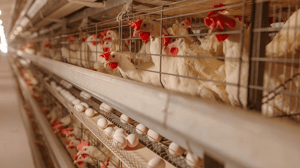7 tech companies looking to dominate grocery7 tech companies looking to dominate grocery
Big and small, emerging and established, tech companies are elbowing into the grocery space. Here’s a small sample of the players vying for attention during the first day of the Groceryshop trade show Tuesday.

It’s an understatement, of course, to say that the pandemic reshaped consumers’ relationships with grocery stores and forced a radical reimagining of the industry.
Add to those shifting consumer behaviors a dangerous mix of inflationary pressure and supply chain challenges, and grocery has no shortage of pain points.
Swooping in like white knights, though, was a ballroom full of high-tech companies during the first day of Groceryshop’s trade show Tuesday—some startups and others stalwarts—looking to help grocers cure what ails them.
Couldn’t make it to Las Vegas? Here’s a look at just a small sampling of the movers and shakers at the industry event.
Afresh

Afresh / All photos courtesy of Heather Lalley
Founded in 2017, Afresh last month announced a $115 million fundraising round. The San Francisco-based company uses artificial intelligence to help with forecasting, inventory and ordering in the fresh produce department, but said it has plans to expand to meat and bakery. Afresh’s platform is slated to be rolled out in more than 2,300 Albertsons locations by year end. The company has said that it tripled its customer base in the last year, joining forces with both regional and national chains, including WinCo Foods, Heinen’s, Save Mart, Bashas and Cub Foods.
AutoStore

AutoStore
Kroger’s Ocado-powered fulfillment center robots tend to get all the headlines, but the team at AutoStore is looking to change that. AutoStore has been around since 1996 and claims to have invented cube storage automation. It’s now pushing hard into grocery, working with retailers such as H-E-B and H-Mart, to reduce the space needed for inventory storage and boost order fulfillment efficiency.
Brightdrop

Brightdrop
General Motors’ commercial electric vehicle brand Brightdrop didn’t set out to get into the grocery business. But the company this week signed on Kroger as its first food retail customer for its Trace Grocery electronic cart. The device attempts to solve the inefficiency problem of bringing groceries from the store to cars for curbside pickup. It’s a big electric-powered box, with multiple smaller compartments to store grocery orders. Future iterations of the product will feature light-up numbers so customers know exactly which numbered drawers to open for their groceries.
Gladly

Gladly
As online grocery shopping and delivery has grown, so too has the potential for order errors. Tech company Gladly offers customer support via both live workers and bots for a variety of brands. But it is just now working to edge its way into the grocery space. Gladly works on a variety of platforms, including call support, chat, social media, email, text and more to free up a company’s employees for other tasks.
Microblink

Microblink
Microblink uses artificial intelligence to scan receipts, extract purchase data and put that info to work in promotions and customer loyalty programs. But an emerging area of its business uses machine learning to let shoppers interact with items on grocery store shelves. With the company’s technology, shoppers hover their phone over, say, a box of cereal and are served up a host of information on the screen, anything from product reviews to coupons to nutrition information and more.
Uber Eats

Uber Eats
The growth of former restaurant-only delivery providers into the grocery/convenience store space has been one of the more-interesting story lines in recent years. Uber Eats is currently in the midst of remaking its app to highlight the tens of thousands of non-restaurant retailers from which it delivers. The delivery platform is working to provide both very fast convenience-type deliveries, as well as larger grocery delivery orders. And Uber Eats recently announced a partnership with autonomous vehicle company Nuro to make person-free deliveries.
Upshop

Upshop
Upshop is the recent rebrand of Applied Data Corporation, which has been around for more than three decades. But the tech company, which has more than 28,000 retail partners, merged with Itasca Retail this week to create a unified platform for inventory, ordering and forecasting across all store departments in real time. Itasca customers include Wegmans Kroger, Cardenas Markets and Raley’s.
About the Author
You May Also Like






